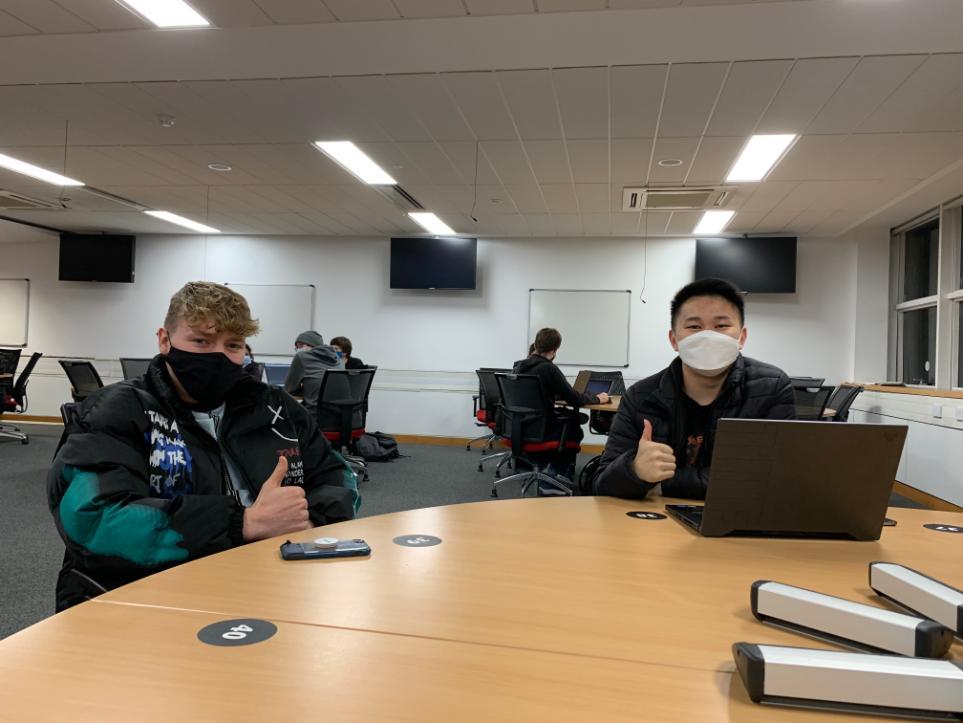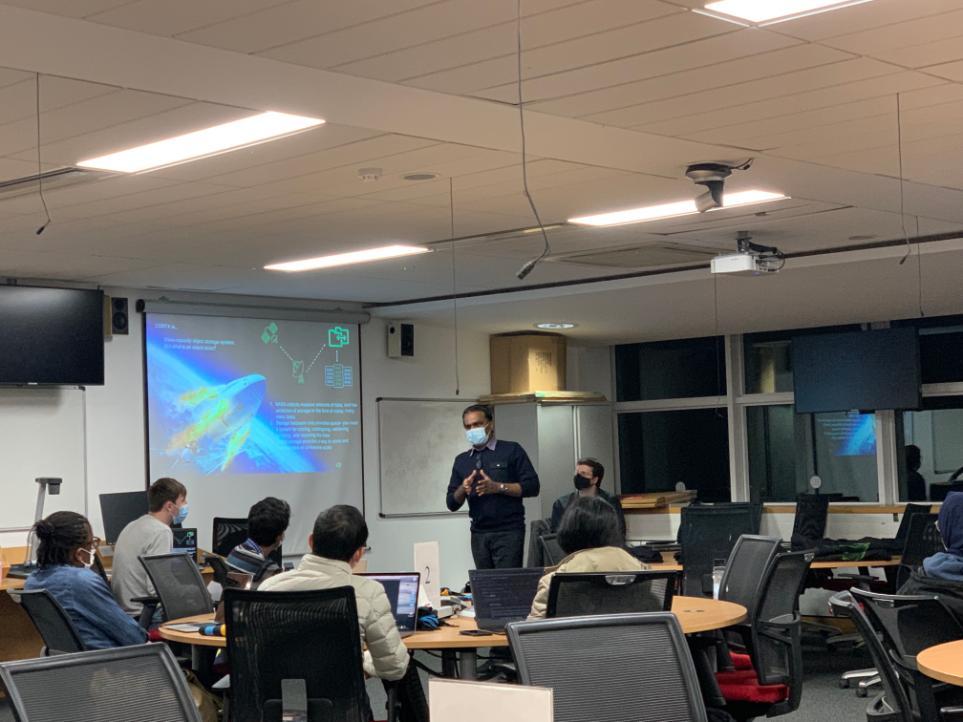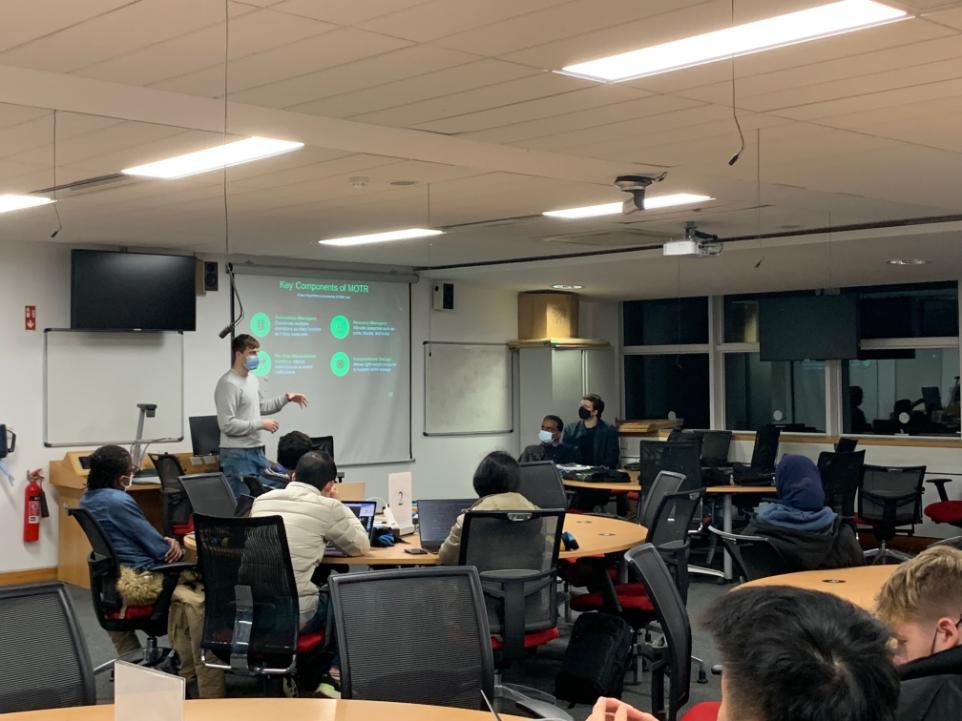Seagate CORTX Challenge
News
- CS News 2025
- SECURENET 2025
- EoI for Postdoctoral Fellowships 2025
- “Back to the Future” Advanced AI Careers Evening
- SOLARIS Shortlisted for Best Research Project at the 2025 Education Awards
- First global carbon neutral conference in ICT for Sustainability
- ARMOR: Advancing AI-Driven Security for 6G Open RAN Networks
- AI research and education at UCD and career opportunities in Ireland
- Political Bias on X before the 2025 German Federal Election
- A new Book co-authored by UCD CS Assoc. Prof. Madhusanka Liyanage Explores the Foundations and Applications of Mobile Edge Computing
- UCD NetsLab Leads a Global Consortium to Tackle 6G Security Challenges
- First students conferred with MSc in Cybersecurity
- Second Workshop on the Responsible Use of Generative AI in Research
- First BDIC Conference on Computer Science and Electrical/Electronics Engineering
- Paul Gillen - global leader in the fight against cyber crime
- CS students awarded Naughton Foundation Scholarships
- First Workshop on the Responsible Use of Generative AI in Research
- Dr Brett Becker (1976 - 2024)
- UCD Computer Science Researchers Receive ReCLAIM Award for GenAI Project
- MSc Cybersecurity Research Project Presentations 2024
- UCD BSc Computer Science Conferring 2024
- UCD NetsLab Launches ORAN Testbed to Advance Security and Privacy in Beyond 5G and 6G Networks
- UCD CS Netslab researchers in a global collaboration to bolster Zero Touch security and privacy for 6G networks
- UCD STEM Early Career Researchers Symposium
- EoI for Postdoctoral Fellowships 2024
- CS start-up a finalist in VentureLaunch Accelerator Programme
- University College Dublin Joins ROBUST-6G Project
- Cyberwise Cyber Security Shared Learning Day
- 2nd Summit on Security and Privacy in Future Mobile Networks (SECURENET) 2024
- Message from the Head of School
- Ulysses Medal Awarded to Professor Geoffrey Hinton: The Godfather of AI
- UCD CS academics invited to organise prestigious Dagstuhl seminars
- UCD College of Science Women in Science Mentoring Awards
- PhD Poster Event 2024
- “Back to the Future” Software Engineering Evening
- Improving resilience to the threat of coastal flooding
- Alumnus In Conversation - Fergal Reid, VP of AI at Intercom (PhD 2013)
- Computer Science Summer School
- Welcome to CS News 2023
- EoI for Postdoctoral Fellowships
- EU MSCA SE RE-ROUTE Project Kicks Off to Design Futuristic Multi-Modal Transportation Platform
- PhD Poster Event
- UCD wins at AI Ireland AI Awards
- UCDCS Athena SWAN Award
- Jan Łukasiewicz
- International Men’s Day
- 1st Year BSc Halloween Networking Event
- Ada Lovelace Energy Hackathon
- 5G for digital healthcare in COVID-19
- UCD CS Faculty Elected Vice Chair of ACM SIGCSE
- CS Big Data project for strategies to combat childhood obesity recognised for its innovation potential
- Welcome to CS News 2022
- UCD CS to host the 27th ACM Innovation and Technology in Computer Science Education
- UCD Computer Science Success in SFI Frontiers to the Future
- Why study Computer Science at UCD?
- CAMEO project receives funding from the Disruptive Technology Innovation Fund
- Congratulations to the Class of 2021 - MSc Forensic Computing & Cybercrime Investigation
- Computer Science Colleagues’ success in Interdisciplinary Research Scheme
- ML Labs Annual Newsletter
- Seagate CORTX Challenge
- UCD Academic awarded the 2021 Beijing Great Wall Friendship Award
- Recent funding successes and industry collaborations
- EU H2020 SPATIAL project
- recsyslabs - privacy preserving personalisation for publishers
- Congratulations to our recent PhD graduates
- UCD In Conversation: Cybercrime causes, trends, and prevention
- CS researchers partner in three successful Disruptive Technologies Innovation Fund projects
- Welcome to CS News, the new UCD CS magazine
- Congratulations to our recent PhD and research MSc graduates
- New book showcases digital forensic research by UCD law enforcement graduates
- Training the next generation of Computer Scientists
- Industry Partnership Event to showcase new research on using machine learning
- Poems that Solve Puzzles: The History and Science of Algorithms
- A welcome to incoming first year Computer Science students
- Zoom for Thought with Prof. Muthoni Masinde
- iPROCEEDS-2: Starting of the long-distance master programme on forensic computing and cybercrime investigation
- Short Term Contract Positions Opportunities
- Most Influential Paper Award at the 28th International Requirements Engineering Conference
- From the School of Medicine in partnership with the School of Computer Science
- 2nd Workshop on Implementing Machine Ethics on 30th June
- CeADAR receives Enterprise Ireland Funding for a new Supercomputer
- Assistant Professor Brett Becker awarded Research Fellowship
- UCD CS Masters Student wins prestigious Intel Student Scholarship
- Navigating COVID19 data with a little help from a tame data scientist
- PhD Positions
- UCD Computer Science Project Nominated for Two Education Awards
- Vacancies - Lecturer/Assistant Professor in Computer Science (x2)
- Ad Astra Fellows - Applications to Computer Science
- CALL OPEN - PhD Scholarships 2020 in Machine Learning
- Commissioner of An Garda Síochána visits the School of Computer Science for Conferring
- Computing Education Group SIGCSEire to launch in UCD on December 11th
- UCD Computer Science wins over €34m in Research Grants in 2018-19
- UCDCS Best Short Paper award 13th ACM Conference on Recommender Systems (RecSys)
- CS Sparks Programme
- CS Sparks
Seagate CORTX Challenge
UCD CS Women@CompSci hosted this event on 17 November 2021 in the School of Computer Science.
The aim was to provide an opportunity for students to meet and have fun, while sharing an interesting intellectual challenge, and to foster a sense of belonging in the school and to promote diversity and inclusion. 28 students took part, from first year Undergraduates to Masters and PhD students. Our partner Seagate designed and ran the challenge and sent along three mentors to run the challenge: Patrick Hession (a UCD CS grad) and two from Seagate’s UK European R&D team, Ganesan Umanesan and David Vasiliauskas. On behalf of UCD W@CS, Dr Fatemeh Golpayegani, Assistant Professor, UCD CS welcomed everyone and thanked Seagate for their support.
Over 3 hours in small teams, students embarked on a real-world engineering challenge supporting each other and with help from Seagate mentors.
The Science of Storage
The world runs on data these days, and more and more of it is being retained and stored than ever before. Yet the hard limits imposed by the laws of physics have meant that the science of storage has had to become more creative in order to keep up. In addition to developing more exotic ways of storing bits on drives, the software that manages storage has become an important part of the solution. New storage platforms can use available storage more efficiently, be optimized for specific uses (such as running simulations), and be designed to take advantage of new developments in the hardware to ensure that data storage, recovery, and retrieval is as efficient, effective, and fast as possible.
Storage innovations and challenges
CORTX is Seagate’s mass-capacity object storage, an open-source project designed to demonstrate how to best marry innovations in storage hardware with innovations in storage software. One of these innovations is something called FDMI (file data manipulation interface). One of the challenges that data scientists face is performing data analytics on new data in a timely and efficient manner. FDMI allows data scientists to subscribe to event notifications and then perform custom manipulations or analyses on newly created (or updated) data.
The challenge
Participants were asked to create a Python script that would keep track of the 40 most popular words in a folder of their choice on their desktop in order to emulate the FDMI functionality of CORTX. FDMI is a publish subscribe mechanism by which external parties can monitor for “interesting” events without having to expensively poll. This is unique to CORTX as with other object storage systems you would have to dive deep into the code in order to add this functionality whereas with CORTX you can just plug in FDMI. So the idea for the challenge was to emulate a storage system using a local folder on your machine and then create the python script that would "listen" to your folder and update the word count as files were removed/added to this folder. 5 out of the 8 teams managed to complete the challenge within the 2-hour window we gave them. One team even managed to add an interesting printing function to make their results look nice.
Keeping everyone safe
We limited numbers to allow social distancing and gave breaks for participants to go outside (with drinks and snacks provided by Seagate). All participants had to
wear face coverings and show COVID vaccination certificates. Each participant received a Seagate T-shirt!



To be first to hear about future events of this kind, join or follow us!
- Website: (opens in a new window)UCD Women @ CompSci
- Instagram: (opens in a new window)@ucdcswomen
- Twitter: (opens in a new window)@ucdcswomen
- Facebook: (opens in a new window)UCD Women At CompSci
- LinkedIn: (opens in a new window)UCD Women at CompSci
Published 25.11.21